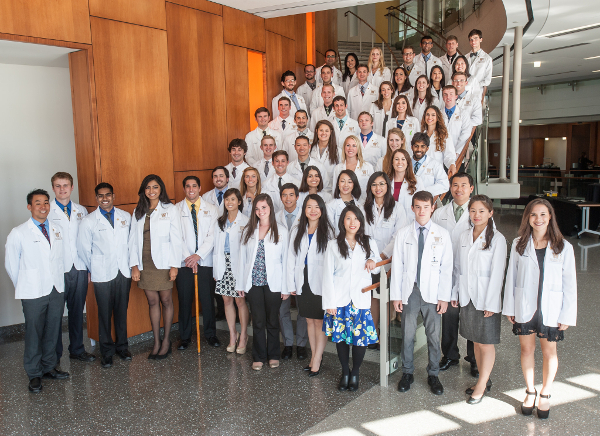
As they prepare to graduate in May, students in WMed’s inaugural Class of 2018 have successfully completed a key step as they get ready for residency training and life post-medical school – passing Step 1 of the United States Medical License Examination (USMLE) with scores that are above the national average.
The USMLE is a three-step examination for medical licensure in the U.S. and passing scores on each of the three exams – Step 1, Step 2 CK, and Step 2 CS – are required for advancement and graduation from the medical school’s MD program. Over the past several months, students from the Class of 2018 took the USMLE Step 1 exam.
“I performed better on Step 1 than I ever expected to, and I owe that in great part to WMed,” said fourth-year student Sam Yost, who serves as president of the Class of 2018. “The education I received in M1 and M2 was enough to score above passing range before I ever started studying for the exam specifically, and put me in a position to prioritize learning how to be the best physician I can be over learning how to best take an exam.
“With so many phenomenal teachers in all phases of my education, I was able to enter the period in which I studied for this exam with more comprehensive preparation than I ever hoped for, and my result reflects this,” Yost added. “I very much appreciate the WMed approach to our training, and I would – and have – recommend this school to anyone.”
Step 1 assesses a student’s understanding and the ability to apply important concepts of the basic sciences to the practice of medicine, with special emphasis on principles and mechanisms underlying health, disease, and modes of therapy. Step 1 ensures mastery of not only the sciences that provide a foundation for the safe and competent practice of medicine in the present, but also the scientific principles required for the maintenance of competence through lifelong learning.
WMed received the USMLE Step 1 results for the Class of 2018 earlier in September. A total of 49 students took the exam with 98 percent passing. That first-time pass rate is better than the national average of 96 percent. Reported scores range from 1 to 300, and the current minimum passing score for Step 1 is 192. The mean score for WMed students was 231 with a standard deviation of 15 compared to the national mean of 228 with a standard deviation of 21.
“I’m pretty proud of my Step 1 score,” fourth-year student Heather Chen said. “My score ended up being higher than my average score on my practice tests. I am now able to confidently apply to top residency programs in my field.
“It was challenging to explain to people outside of my school why we were taking (USMLE Step 1) after our third year,” Chen added. “I just had to put a lot of trust into previous data and the decisions made by the (WMed) administration. I remember when we took our first NBME (National Board of Medical Examiners) after our third-year clerkships had ended and many of my classmates thought that some questions were very easy since we had built up clinical knowledge. I think doing it after year three paid off and most of my classmates were happy with their score. Having our curriculum structured by organ systems helped me make connections and organize my studying. A lot of Step questions require you to integrate various pieces of knowledge together. We do that in our organ system classes.”
Fourth-year student Nick Beam said he felt very prepared for USMLE Step 1 and, like Chen, he believes that taking the exam after his third year at WMed was beneficial to his success.
“After third year, I had great context to learn and recall the various details needed for Step 1,” Beam said. “I can only speak from my experience, but I can’t imagine I would have done better taking it a year earlier.”
USMLE Step 1 scores are key outcomes for our students. As a new school, the scores are particularly important as they validate that the medical school’s integrated curriculum provides a solid foundation for our students to prepare and perform well on the USMLE exams.
Fourth-year student Diti Ronvelia said that she believes gaining a year of clinical medicine during her third year at WMed before taking USMLE Step 1 had “a major influence” on her score and success.
“Understanding and witnessing the pathology of what I was studying throughout third year was huge in consolidating my learning and allowed me to directly apply this knowledge as I studied for Step 1,” Ronvelia said.
Ronvelia’s classmate, Satya Dalavayi, echoed Ronvelia’s sentiments and said that the curriculum at WMed “helped me begin thinking like a clinician before I took Step 1.”
“This mindset helped me establish mental associations that made studying for Step 1 a lot easier than I would've expected,” Dalavayi said.
WMed has always anticipated reporting student outcomes on USMLE examinations publicly on the medical school website. In the future, as the data becomes available, WMed will also publish the graduation rates and first-time board pass rates of our graduates.
“On behalf of the Board of Directors and senior leadership, I want to thank the medical school faculty for their hard work, dedication, and commitment to student learning,” said Dr. Hal B. Jenson, the medical school’s founding dean. “We also recognize the involvement of our residents and fellows who are teaching and mentoring our students, and also our staff who deliver excellent work every day with a focus on meeting the needs of our learners, our patients, and all who we serve.”
